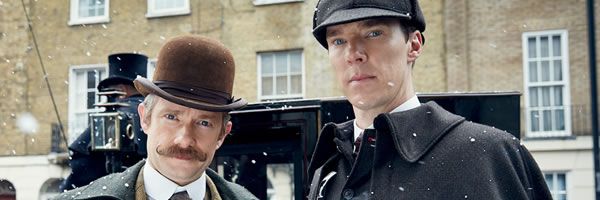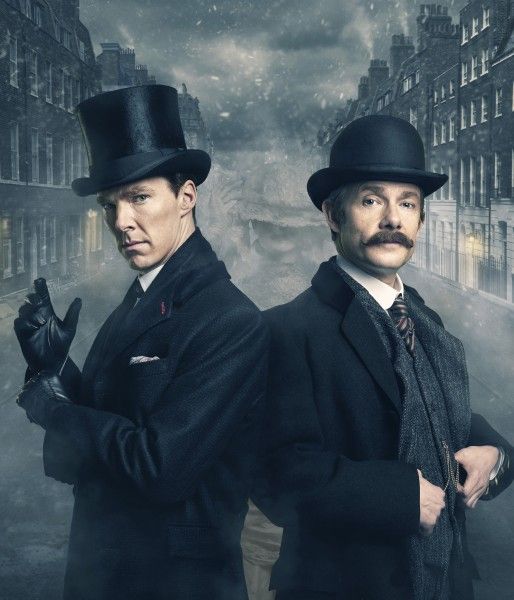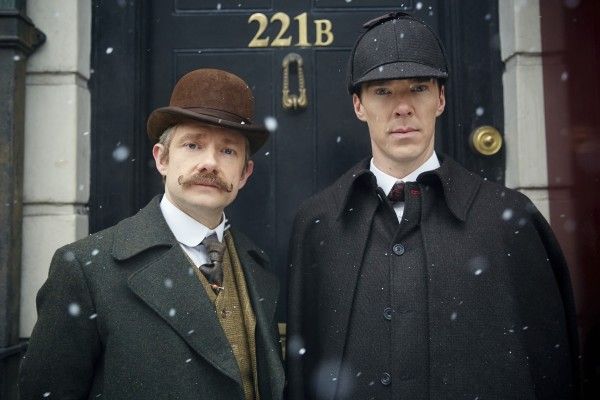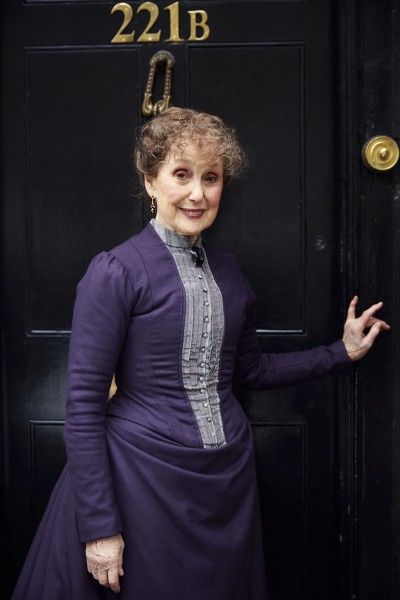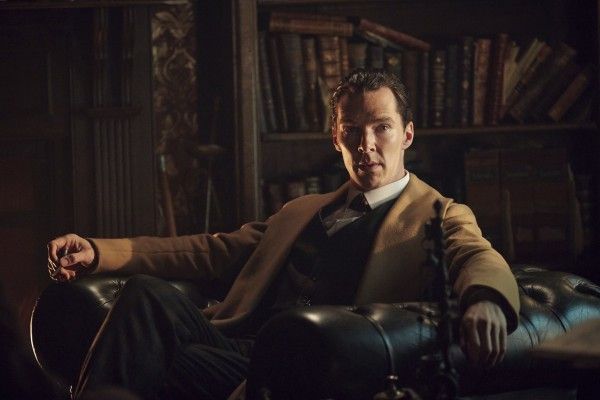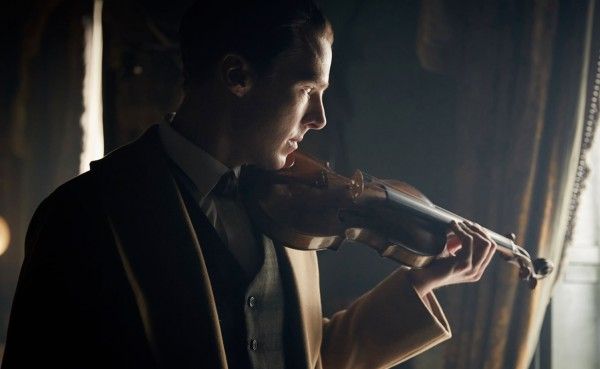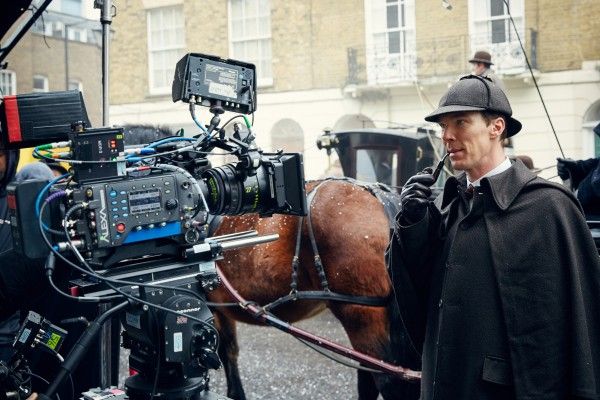Co-written by Steven Moffat and Mark Gatiss, the 90-minute special Sherlock “The Abominable Bride” will premiere in the U.S. on Masterpiece on PBS and the UK on BBC One on January 1, 2016, and it will see Sherlock Holmes (Benedict Cumberbatch) and Dr. Watson (Martin Freeman) in 1890s London. It marks the first time that fans of the modern retelling will get to see this iteration of the characters in the Victorian era of the Sir Arthur Conan Doyle stories.
During this exclusive phone interview with Collider, Masterpiece executive producer Rebecca Eaton talked about the moment she learned that PBS would have a bonus Sherlock episode to air, to assume nothing with this new installment, why this Victorian era set story is a seamless transition from the modern-day retelling, how nerve-wracking it is to never know when they’ll get a new season of episodes, why Masterpiece is committed to continuing the series and the logistical nightmare a Sherlock/Doctor Who cross-over would be. She also talked about the end of Downton Abbey and what they’re looking for, in new programming.
Collider: This Sherlock special, premiering on January 1st, lets us see the traditional Sherlock Holmes. When you first heard that Steven Moffat wanted to do a Sherlock story set in the traditional Victorian era, as opposed to the modern-day setting that we’re used to, what was your reaction? And how exciting was it to know that you’d have a bonus Sherlock to air?
REBECCA EATON: When I first heard about it, it was literally whispered into my ear by Sue Vertue, who is the producer and who also happens to be married to (show creator) Steven Moffat. She whispered in my ear, at a really crowded, noisy party, and I couldn’t understand what she was saying. But I thought it was very cool and I thought it was going to be a real challenge to keep it a secret, as long as we had to and as well as we did. It was very carefully kept a secret and judiciously revealed. There was a picture first, and then, little by little, there was more information, like the date and the title, and the newsworthy fact that it would be released on the same day as the BBC broadcast, and that it would be available to see in movie theaters.
It’s so difficult these days to keep spoilers a secret and to not ruin the broadcast for viewers.
EATON: I know. We learned a lot with Downton Abbey about how to keep a secret. When you have continuing seasons and cliffhangers at the end of a season, it’s really hard to keep those. I’ve discovered that people don’t actually want to have things spoiled, and they really try to avoid spoilers.
What can you say to tease what fans can expect from “The Abominable Bride”?
EATON: Steven Moffat is very tricky. That is what makes him so good and that’s what we love him for. Just because you think one thing, don’t assume that it’s true. That’s the usual with him. You can make no assumptions. Nothing is straightforward. With Steven, things are so complicated that it’s easy to be cryptic because he is cryptic. Even dropping a hint wouldn’t necessarily be the truth, the whole truth, and nothing but the truth. Everybody was very up for this. You start to smile, from the first frame, and then you see where he takes it and you just shake your head.
Do you personally find yourself more partial to the Victorian era Sherlock, or do you enjoy the modern-day Sherlock?
EATON: It’s interesting because I’m old enough to remember those really old Basil Rathbone movies on television. I did not see them in the movie theater, but I remember growing up and watching them on Saturday afternoon while I was doing the family ironing, and I loved them. I loved Victorian drama. So, when I took this job and became the executive producer at Masterpiece and Mystery, as it was known 30 years ago when Jeremy Brett was playing Sherlock, he actually was the husband of my predecessor at Masterpiece. I had loved Jeremy’s performance, and I loved the whole way that we had created the Victorian era. It never occurred to me that they could make it contemporary. It just never occurred to me. It would take someone like Steven, who has such a sense of time, in all ways, and Mark Gatiss, because they very much cook it up together, to say, “Let’s go where nobody would think we’d ever go,” and that’s back to the Victorian era. And so much of what we do at Masterpiece is Victorian costume drama from 19th century novels, so it’s very familiar territory to us. The other Sherlock that wasn’t Victorian was a real departure, and it’s hugely popular with a large segment of our audience. But there’s another segment of our audience that probably prefers the more traditional Sherlock, or Miss Marple and Agatha Christie. So, we have something for everyone with this one.
Sherlock doesn’t really seem like he’s much different, whether he’s in the Victorian era or in modern-day, because he just is who he is, no matter the time period.
EATON: That’s Sherlock, and it’s also Benedict [Cumberbatch]. Benedict has certainly played his share of period characters. We had him in Masterpiece a long time ago, in something called To The Ends of the Earth, which was a late-18th century drama where he played an upper class twit on a voyage to Australia. And he’s a classically trained actor. He can be very modern and contemporary, but he’s also very comfortable doing period drama.
Has it been nerve-wracking for you, knowing just how popular Sherlock is with audiences, to never know exactly when you’re going to have another season?
EATON: Yes! It’s terrible. Audiences so want more, and I get that question over and over again, about when there will be more, but I don’t know. And if it’s nerve-wracking for me, Sue Vertue has to wait until Steven Moffat has all of his Doctor Who scripts done and out of the way, and then Mark Gatiss has to be free, so that they can cook up the next batch. And then, they have to wrangle up the boys, who are really in demand, arguably because of Sherlock. So, we have to wait patiently. Benedict [Cumberbatch] and Martin [Freeman] are very loyal to the series, and they love doing it. It’s tons of fun for them and they’re well taken care of.
Do you think that Sherlock can keep going, or do you think this next season will be the last?
EATON: I don’t want to know, if that’s the case. I really don’t. But, I have no sense that it will be the last. Nobody is saying that. They’ve got to write it, shoot it and broadcast it, which can take a couple of years. But, I think everybody is hoping that it goes on and on. It really depends so much on Steven and Mark continuing to have good ideas. I know that the BBC and we (at Masterpiece) are completely committed to doing as many as they want.
What do we would have to do to make a Sherlock and Doctor Who cross-over episode happen? Would it be impossible to do something like that with all of the different networks involved, or do you think it could happen if everyone worked to make it happen?
EATON: I never thought about that! Well, first of all, they’re both BBC and both Steven, so they have that in common. But, why would you want to do that? That would be too much. You don’t want to do that. Then, it would depend on which Doctor it is. The thought of trying to wrangle Peter Capaldi and Martin and Benedict and Steven just gives me a headache.
Going back to the beginning, how was Sherlock first brought to you and what was your immediate reaction?
EATON: I’m embarrassed to say, after it was brought to me as, “What do you think about doing a contemporary Sherlock?,” and Steven’s name wasn’t linked to it and it hadn’t been cast, I thought, “I’m not sure we really need that. We had Jeremy Brett and he was so good. Why would you make it contemporary? It’s so Victorian.” But it is a buddy story, in many, many ways. It is about the chemistry between those two characters, no matter what the era. And mysteries are timeless. People love solving puzzles, and you always love it when somebody smarter than you is solving puzzles. I should have been a little more aware of that. And then, when Steven’s name was mentioned, the Doctor Who fanatics in my office went crazy and said, “We have to do this!” So, I had no choice.
How nerve-wracking is it to be airing the last season of Downton Abbey, starting on January 3rd, and then have to find programming to take its place?
EATON: Well, we already have, actually. Poldark had an incredibly strong audience. From Episode 1 of Downton, it was incredibly popular, even though we didn’t know how much it was going to take off. And there is a real groundswell and interest in Poldark, as well as Grantchester with James Norton, which was a small six-part mystery set in the ‘50s in a little village. He plays a minister, but he is devastatingly handsome and got a lot of attention. And Indian Summers is a returning series. It’s challenging, but it’s not nerve-wracking. There will never be another hit as big as Downton. Maybe there will be, but how often does lightening strike? Probably not more than once. I just find it personally gratifying. I’ve been doing this for 30 years, so to have a giant hit after your 25th year as a producer of shows is just hugely gratifying.
Is it odd for you to hear these shows compared to Downton Abbey, or is that something you happily welcome?
EATON: It’s inevitable. Downton became the gold standard, and it became a comparative thing. Anybody who pitches a story or an idea for a film to an executive, whatever the latest hit is, is what you’re comparing it to. For television, that’s Downton Abbey. It’s a huge compliment when something is compared to it. I’m very proud of that, and don’t mind it, at all.
You got the opportunity to go to the Indian Summers set in Malaysia. Do you like to try to get to the sets of the shows that you produce for Masterpiece?
EATON: I do it when I can. When they’re in London and I happen to be over there when they’re shooting, I like to go and see everyone. People are working on a set. It’s not like they need to have a suit come on. Also, if you spend any time on the shooting of a drama, for television or movies, it’s very slow and there’s a lot of standing around. So sometimes, the actors are thrilled to have visitors because they’re just waiting most of the day. It’s the directors that are a little busy. So, I like to go, but I don’t make it a point to go to every one. I was just on the Grantchester set in London. They happened to be shooting when I was there in August. Poldark is shooting in Cornwall, and I did go to Cornwall last June, but they weren’t shooting.
All of the shows on Masterpiece are so different from each other, but one thing they have in common is multi-layered, multi-faceted characters. Is that something that you look for when you read scripts, or is that just your own personal taste shining through?
EATON: I think it’s both. My taste has merged with what I know of the audience’s taste. I try to channel what they have liked. The choosing part is very subjective. In this job, one has to recognize that it’s a very subjective function. You have to go with your gut. You have to take in other opinions that you value. You have to think about what else like this has worked or not worked. You have to take chances. You want to find something you believe in, even if it’s not going to have a huge audience. For instance, Wolf Hall is something I believed should be on Masterpiece. It’s a masterpiece of a book, and that’s what we do. The book is challenging and the drama was spectacular, but challenging. You can’t sit there and talk on the phone or tweet while you’re watching it. You watch and listen to it. It’s beautifully written and beautifully acted. But I do love character, and I do love complicated people who are well drawn. When complicated characters aren’t well drawn, they’re boring.
Sherlock “The Abominable Bride” airs on Masterpiece on PBS and BBC One on January 1, 2016.

